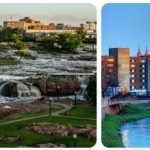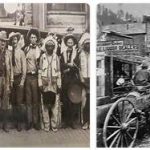The 20th century ended in the South Africa with the handover between N. Mandela, the charismatic president of the end of apartheid and the advent of democracy, and T. Mbeki, an experienced and pragmatic politician, a protagonist of the liberation struggle, who assumed the charged June 16, 1999. Mandela’s retirement, with its explicit connotation of physiological alternation at the head of the state, confirmed the extraordinary democratic normality of the South Africa, which had become, in a relatively short period of time, a reference country for all of sub-Saharan Africa and a element of stability and equilibrium at the regional level. The authority of the South Africa was confirmed by the appointment in 2006a non-permanent member of the UN Security Council. This success, not entirely taken for granted at the time of the democratic transition, which took place after long years of racial segregation and bloody civil war, however, only defined the conditions in which the country had to face both the social and economic problems inherited from the past and the new ones. induced by institutional change in relations between ethnic groups and within them. In particular, the following took on relevance: the need to build an interethnic and unitary national identity, which would overcome the opposition between the oppressed and the oppressors; the persistent racial inequalities, which were overlapping, with the formation of a black ruling class, also growing divergences in the same living conditions of the black population; the spread of the AIDS epidemic; high levels of unemployment; persistent poverty; the overwhelming hegemony, in the national government and in many of the provincial ones, of the African National Congress (ANC), a party-state which, if on the one hand it had proved capable of representing the majority of the population and to collect their votes in free elections, on the other hand exercised such a monopoly of power as to represent a possible limit to the democratic model and to constantly expose it to the risk of corruption and authoritarian involution.
The new government that emerged from the 1999 elections, led by Mbeki, set as priority objectives, in continuity with the previous administrations, the full equality of rights and a more equitable distribution of wealth, within a market economy that avoided a radical confrontation with the white minority and, more generally, with those international economic interests which had re-established relations with the South Africa after the years of sanctions and isolation. From an institutional point of view, in the second half of the 1990s the country had a solid framework of efficient and independent guarantee bodies: Constitutional Court, Electoral Commission, Commission for Human Rights, Commission for Gender Discrimination, Defender civic. Therefore, if there had been a decisive consolidation of the system of rules, also favored by the considerable liveliness and articulation of civil society, on the economic and social level the situation was much more problematic: at the beginning of the century the rate of economic growth was still modest, above all due to the heavy legacy of the past regime, which had brought the country to the brink of bankruptcy. This complicated the government’s plans, which were foreseen by2015 agreed forms of expropriation of 30 % of the land of white farmers, to distribute it among the poorest farmers, and a greater presence of exponents of non-white communities in the leading roles of public administration and companies. Land redistribution programs encountered difficulties of various kinds, and in 2004 it was estimated that only 3% of the land owned by white farmers had actually been transferred to black farmers; moreover, the conversion to commercial production that accompanied this transfer in an attempt to increase the profitability of the land, had in some cases reduced agricultural production for consumption, ending up displeasing both the dispossessed owners and the poorest strata of the population. The slowness and difficulties of land distribution generated strong social tensions and one of the opposition parties, the Pan Africanist Congress, in July 2001 promoted land occupations in the area around Johannesburg, with episodes of violence that seemed to evoke the risk of a crisis similar to that experienced in neighboring Zimbabwe, where during the 1990s attacks on white farmers’ farms had been openly supported by the local government. Mbeki, who had avoided assuming an attitude of explicit condemnation towards Zimbabwe, arousing concern in the international community, responded on this occasion with the eviction of the occupiers by the police. Its policy of moderate liberalism was confirmed by the continuation of the privatization plan of many state-owned companies, which however corresponded to greater public control over natural resources, for example. on the management of the water network. L’ opening to the entire population of health facilities substantially designed to meet the needs of the white minority had also subjected the system to enormous strain, prolonging waiting times for services and generating widespread dissatisfaction with the quality of care, burdened by the weight of the AIDS epidemic. In fact, the disease represented a huge social problem, whose future impact on the economy was difficult to calculate, because it was mainly the population of working age that was affected (inIn 2005 the 19 % of that of the between 15 and 49 years of age, according to UN estimates). Mbeki initially seemed to underestimate the complexity of the problem, even declaring, in general bewilderment, his skepticism about the viral origin of the epidemic (in Durban in July 2000, during the 13th World AIDS Conference), and opposing the free distribution of drugs antivirals to the population affected by the disease. In February 2002 this distribution was started in the province of KwaZulu-Natal, but against the will of the government and on the personal initiative of the Minister of the Interior G. Buthelezi, leader of the Inkhata Freedom Party (IFP, political expression of the Zulu minority and hegemonic force in that province); in July the legitimacy of the initiative, which had been contested by the government before the High Court of Justice, was confirmed by the Constitutional Court. Mbeki’s orientation then began to change, albeit slowly: in October the government announced that it would consider providing the therapy through the public health system, and in December 2003, after an agreement had been reached with two companies European Union for the production of antiviral drugs in South Africa, undertook to guarantee their free administration to at least 53,000 people by March 2004. This was still a decidedly limited measure, and which was, moreover, partially applied (at the end of 2005, according to UN estimates, the South Africa was only in 16th place among the countries of sub-Saharan Africa as regards the percentage of the population affected by AIDS who received antiviral treatments); however, it seemed to initiate a change of line in government guidelines. An important role in bringing about this change had been played by the commitment of many grassroots organizations, but also by Mandela’s personal battle against a group of 39 large pharmaceutical companies, which in the spring of 2001 they were forced to withdraw from the trial they had brought against South Africa, accused of producing antiviral drugs without paying the relative patents, and to admit the right of poor countries to have at low cost effective drugs for the treatment of the disease. For South Africa political system, please check politicsezine.com.
Legislative elections took place in April 2004: the ANC increased its consensus, obtaining 69.7 % of the votes and 279 seats, followed by the Democratic Alliance (DA), of liberal orientation, with 12.4 % and 50 seats, and by IFP with 7 % and 28 seats, while another 9 parties divided the remaining 43 seats. The New National Party (NNP), once a white supremacist party, only got 7 seats. The consultations, while confirming the ANC’s dominant position, highlighted the lack of a realistic political alternative: the major opposition party not only had a modest following but remained largely white. The ANC, which since its establishment had gathered a multiplicity of forces, so much so that at the time of the liberation struggle it was defined as “an African Parliament”, had continued to be a pole of attraction: parties and organizations converged, including even the NNP, after its dissolution following the electoral defeat (Sept. 2005). The substantial disappearance of the parties of the far left also contributed to determining this situation of quasi-monopoly, which, if it often allowed the ANC to settle possible political conflicts internally, tended to diminish the democratic dialectic and lead to a progressive overlap between State and party. It was no coincidence that accusations of corruption frequently emerged against ministers, senior administration officials or party officials. On April 27 Mbeki was sworn in for his second term, and the following day he launched a government with a strong female component and in which, for the first time since the end of apartheid, Buthelezi was not present; the program focused on land reform and combating inequality. But the economic policy choices in the first two years of the new government did not actually appear so incisive and determined. Although GDP growth was more marked from 2004, the high unemployment rate among the black population and the slow pace of land allocation were such as to generate strong social tensions, especially in large cities such as Johannesburg. and to shake the traditional alliance between the ANC, the South African Communist Party (SACP) and the Congress of South African Trade Unions (COSATU), who accused the president of authoritarianism, of marginalizing dissenting voices and of being too obedient to the liberalizing policies of large economic institutions, such as the International Monetary Fund or the World Bank.
On the international level, during the two Mbeki presidencies, the South Africa saw its prestige increased, thanks to a very active diplomacy in the African continent, and through mediation in some of the most complex conflicts (Democratic Republic of Congo, Ivory Coast), either through efforts to promote new organizations, such as the New Partnership for Africa’s Development (NEPAD), or to boost existing ones, such as the African Union.








